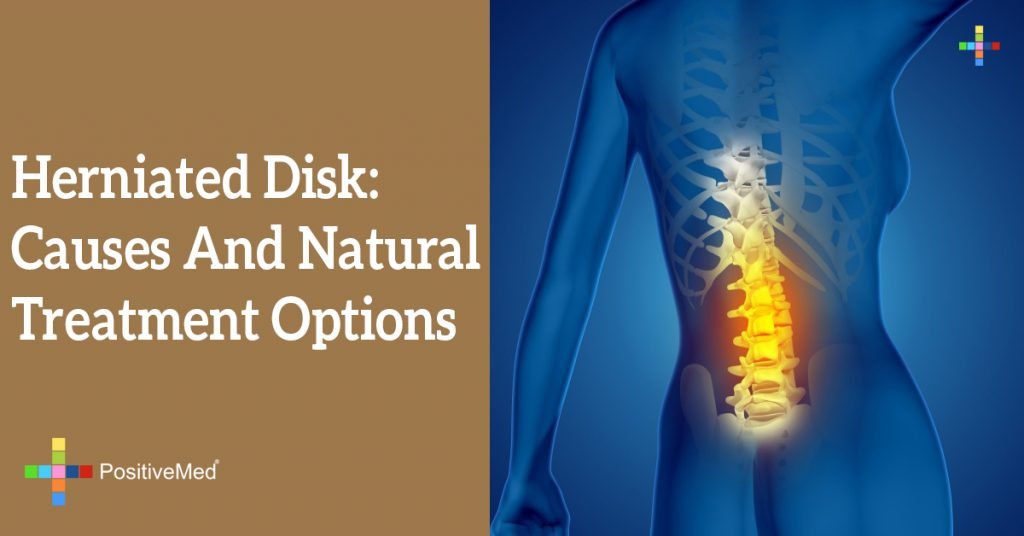
Herniated Disk: Causes and Natural Treatment Options
If you’ve been diagnosed with a herniated disk, you know just how frustrating the pain and unpleasant sensations of the injury can be. Your spine is one of the most functional and yet complex and delicate parts of your body, and when an injury is sustained, peripheral functions can become difficult or impossible. The pain and unpleasant sensations that accompany a herniated disk can change the way you live your life. Fortunately, there are some natural ways that you can find some relief from these frustrating symptoms. First, let’s examine the definition of a herniated disk and its symptoms and causes.
What is a Herniated Disk?
You may be wondering exactly what a disk is and what it means for it to be herniated. Your spine is made up of small individual bones called vertebrae. These bones form a long stack, but they are separated by small disks which are firm on the outside but soft on the inside. These discs allow the spine to give your body mobility because you can move around without the vertebrae that make up your spine being pressed together and causing you serious pain. When a disk is herniated, it means that an injury or another event has caused some of the soft substance within the disk to push through to the outside, limiting the disk’s ability to properly support your spine. Depending on where in the spine this occurs, you may experience any of a variety of symptoms. In some cases, you may experience no symptoms at all – in these cases, corrective action is not generally needed.
Causes of Herniated Disks
One of the main causes of disk herniation isn’t a specific event that you can recall as being painful. It is called disk degeneration, and it is a natural part of age. As your body ages, the disks that separate your vertebrae are less hydrated, which makes them more vulnerable to herniation. It can be difficult to nail down exactly when the disc became herniated since it can take place over a period of time. However, lifting with your back when trying to carry something heavy or otherwise not following best procedure when engaging in serious physical activity can cause a disk to herniate.
RELATED ARTICLE: The 6 Most Helpful Exercises For Your Healthy Spine
Herniated Disk Symptoms
The type of symptoms that your body experiences in response to a herniated disk depends on where in your spine the injury has occurred.
- Lower back: You may be feeling pain throughout your legs as well as in your gluteal area. It is a shooting pain, often caused by sudden movements.
- Upper back: Your shoulders and arms are more likely to be afflicted by shooting pain, which is still caused by sudden movements.
- Overall: You may experience a sensation of numbness and tingling called paresthesia. You may also experience muscular weakness.
Natural Relief For Herniated Disk Pain
Many people prefer to stay away from invasive spinal surgery or pharmaceutical remedies that can become addictive or have unpleasant side effects to which back pain is almost preferable. Fortunately, there are a few ways that you may be able to find relief from the pain and other unpleasant symptoms of your herniated disk.
The key to understanding why these natural remedies can work for you is understanding that the pain you feel when a disk is herniated is caused by the inflammation of the area in response to the herniation. This means that natural methods of alleviating inflammation are great choices when it comes to treating herniated disk pain.
- White willow bark is sold in capsules at natural foods stores and through most vitamin retailers. It can be taken as a pain reliever. Chemically, the makeup of this bark is similar to aspirin, making it an excellent choice for treating your pain. Unlike aspirin, it won’t inflame the lining of your stomach.
- Cooking that goes heavy on tasty herbs and spices like ginger, cloves, turmeric and rosemary. When paired, these ingredients are excellent in stews and curries. Ginger and turmeric are considered part of an Ayurvedic diet, considered to be detoxifying by the people of India.
- Switching out foods high in bad fats and gluten, which can cause inflammation, for healthy anti-inflammatory foods like dark greens, berries, almonds, green tea and other foods rich in antioxidants.
By harnessing the power of nature in seeking relief for your herniated disk, you may just find that you can avoid prescription drugs, surgery and other expensive and invasive treatment methods.





